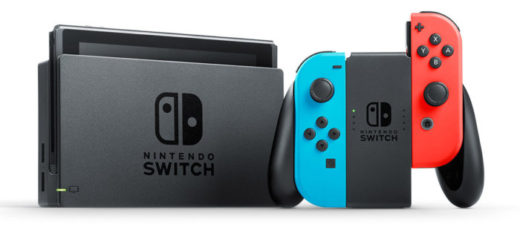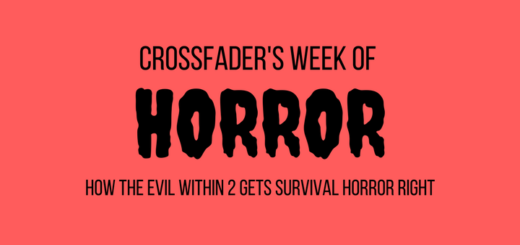SHADOW OF WAR and Cynical Avarice
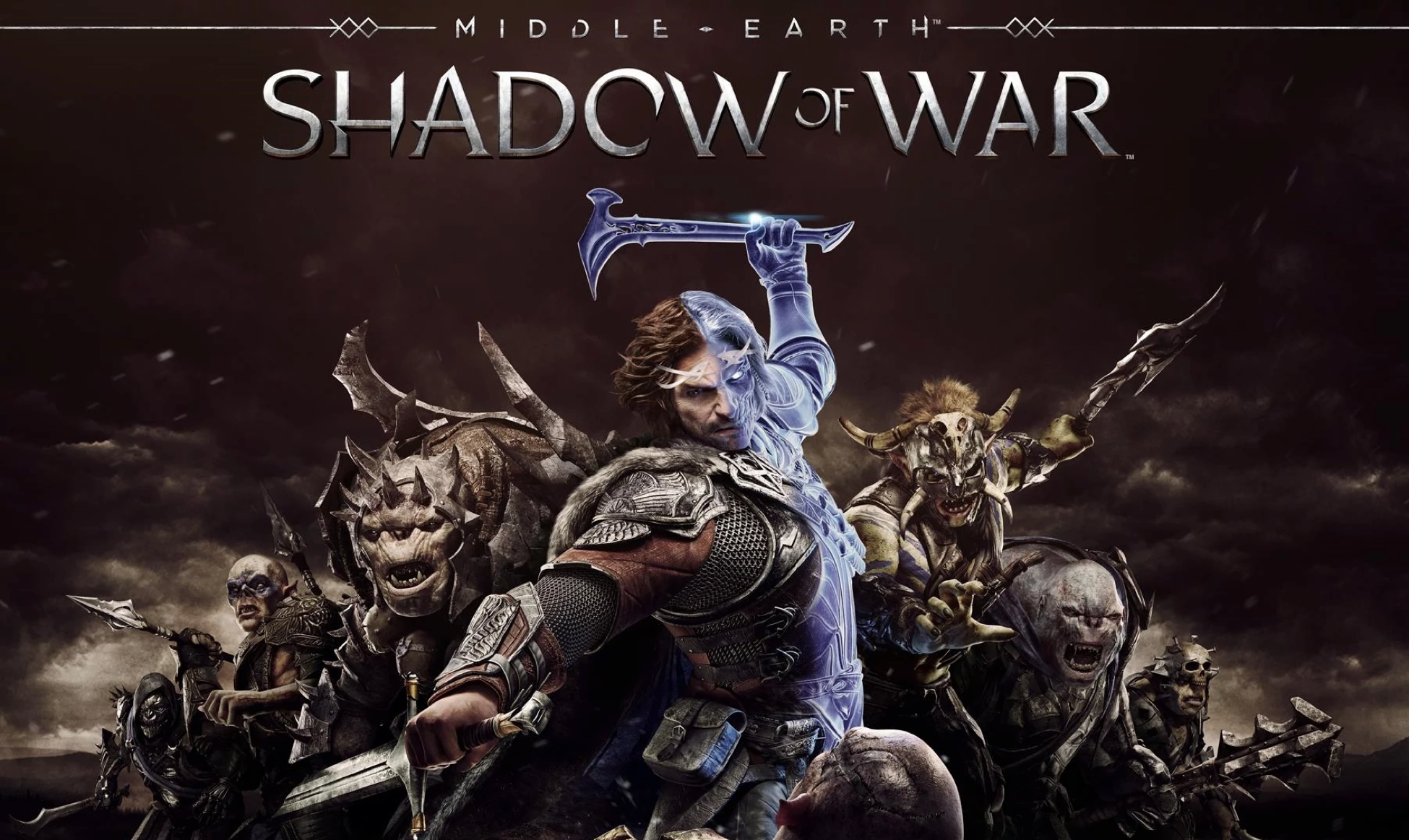
The AAA game industry really relishes in milking their audience for all they’re worth, doesn’t it? (Totally original opinion, I’m well aware.) It should be common knowledge that the big video game publishers, like in any other industry based on artistic creation, prioritize maximizing profits above all else. That’s just basic economics. It should also be common knowledge that you, the person who regularly consumes media content, are just a statistic, an exploitable source of revenue that has been extensively analyzed by these companies not only for your preferences in genre, aesthetic, and structure, but also on your psychological tendencies that feed into your spending habits.
Freemium mobile games blatantly proved that a product doesn’t even need to cost anything for the consumer, or require any real capital or effort to develop for that matter, in order to rake in ungodly amounts of cash. The big boys of the video game industry were paying attention, and have since been spending time and money trying to perfect the formula and integrate it into the mainstream console market, taking advantage of our inherent laziness and addictive tendencies to get away with increasingly brazen displays of interactive capitalism. 2017 just seems to be the year where publishers of all kinds have decided to open the floodgates to see just how much they can get away with in the name of a couple extra bucks.
As much as I can rant about the existence of microtransactions and the avaricious nature of AAA game companies, we also ultimately have to recognize that it is at least partly our fault as an audience that these exist so prevalently. Publishers like Warner Bros., Blizzard, and EA may shell out tons of quick-‘n-dirty, pay-to-win piecemeals or purchasable advantages and then shamelessly present us with the option to buy or gamble for them. Yet we’ve obviously bred a market for this, as depressingly large numbers of consumers willingly forego the grind and buy things that will give them a competitive edge, make paltry cosmetic changes that don’t enhance the experience, or just cater to our innate desire for immediate satisfaction. I mean, people can and do spend hundreds of real-world dollars on OVERWATCH loot boxes so they get the chance at a cosmetic change, for fuck’s sake! And I am keenly aware of the arguments of “If you don’t like it, don’t buy it!,” or “It’s just cosmetic, what’s the big deal?,” both of which make me roll my eyes so hard they detach from the nerve so I can stare at my own brain. The issue that arises from those kind of statements is that the big publishers thrive on that level of complacency, and that those give them the freedom to make even worse anti-consumer decisions with little threat.

Artist’s rendition
It’s not even a question at this point whether Warner Bros. Interactive’s most recent title is going to make a disgustingly massive sum of money. MIDDLE EARTH: SHADOW OF WAR is the sequel to the critically-acclaimed and financially-successful SHADOW OF MORDOR, a title that’s based loosely in the adored J.R.R. Tolkien universe, boasts excellent visuals, decent gameplay, and is lauded for the introduction of the dynamic “Nemesis system.” For all intents and purposes, SHADOW OF MORDOR is a polished package, and to give credit where it’s due, SHADOW OF WAR may even be better in some respects.
Undoubtedly, the Nemesis system is the backbone for this franchise (moreso now than before), and its implementation has improved since its debut in the first game. The droves of Orcs that you slay and/or brainwash to join your army all have dynamically changing tactics, personalities, strengths, and quirks that shift based on your methods of taking down their brethren, and are strangely enough the best-written aspect of the whole game. (We’re in dire straights if algorithms are generating better scripts than screenwriters, but that’s a story for another day.) Added in conjunction to the Nemesis System are Vendetta missions, in which you can hunt down a specific high-ranking Uruk-Hai, such as one that had previously killed you or another player, and receive additional rewards as a result. The combat is largely the same as in the previous installment, having a sort of mish-mash between the style of the Batman: Arkham series’s rhythmically-choreographed flow and your standard fantasy-RPG action that is equal parts amusing and trite. What this all boils down to is that SHADOW OF WAR has at least some things going for it, and there is no doubt in my mind that it will be another market success like its predecessor.
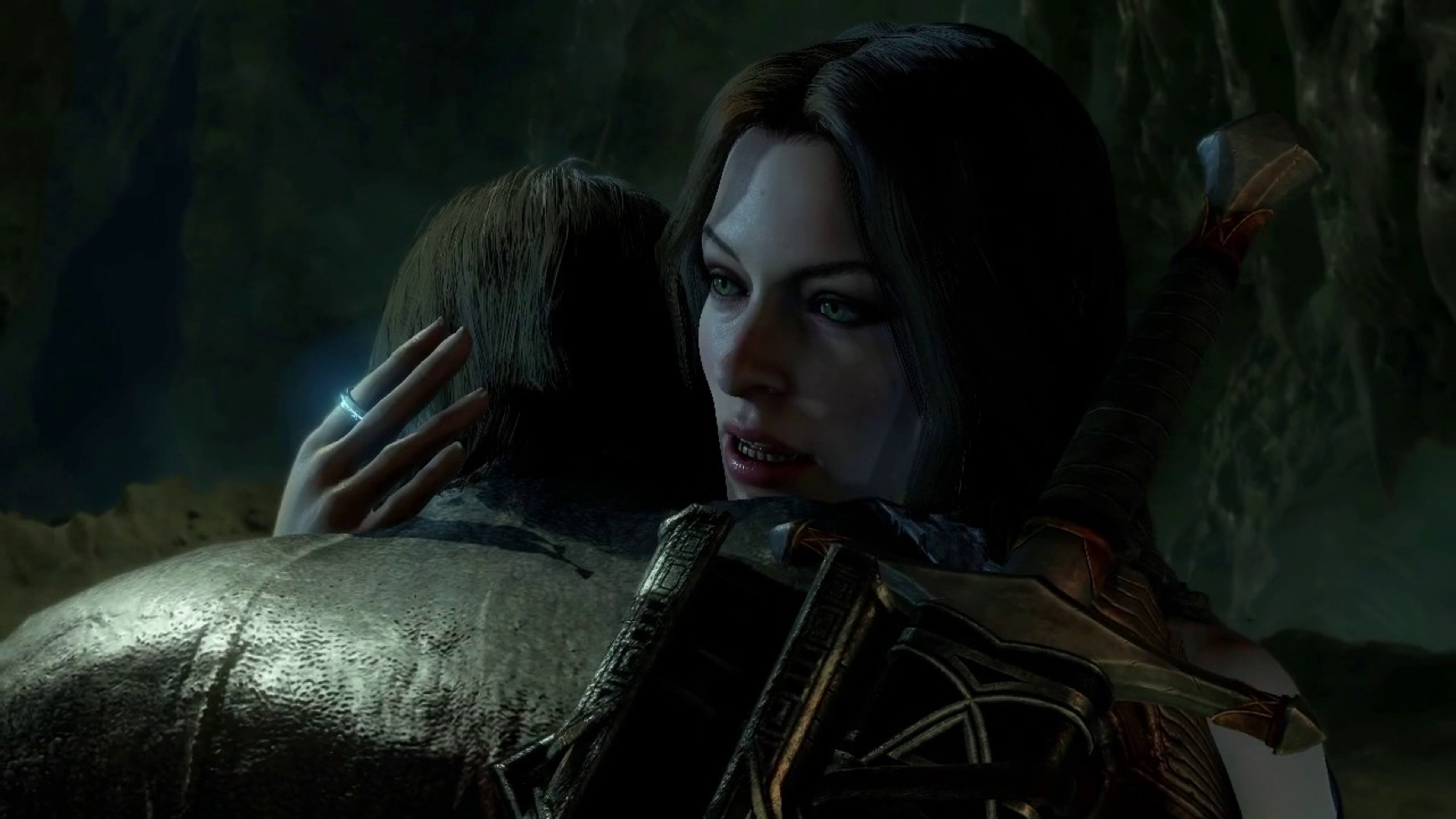
I take it back. Sexy Human Shelob is the real backbone of this game
That being said, the main issue I take umbrage with is the economy of the game, and how Warner Bros. insidiously guides you toward its element of microtransactions. The end goal of SHADOW OF WAR is ultimately to collect hordes of powerful Orcs like crude, flesh-eating Pokemon, enslaving and capturing the most powerful stock to help command your army in your march against Sauron. While the most desirable tier of Orcs may potentially be found within the game naturally, they are exceptionally rare to come across, especially in the late-game. Likewise, the Orcs are (with rare exception) randomly generated, so even if you eventually find a powerful enough character, they may not be what you’re looking for. Finding the right match can potentially take hours of trial and error.
That’s where the Market comes in. Featured prominently in SHADOW OF WAR is a non-diegetic marketplace wherein you are able to trade in in-game currency, as well as utilizing actual, real-world money, to purchase new gear or directly recruit high-value Orcs via a loot box system. True to form, these loot boxes come in tiers based on how much in-game currency or cold, hard cash you’re willing to pony up, with the “Epic” and “Legendary”-tier swag costing the highest amount of moolah. And yet even here, the items or Orcs you receive are randomly generated. There’s no other way of saying it: this is glorified virtual gambling. This actually reflects a wider trend in the gaming world, as more and more video games add gambling elements and online gambling becomes more like gaming. Some people have even begun to ask: is gambling shifting to gaming?
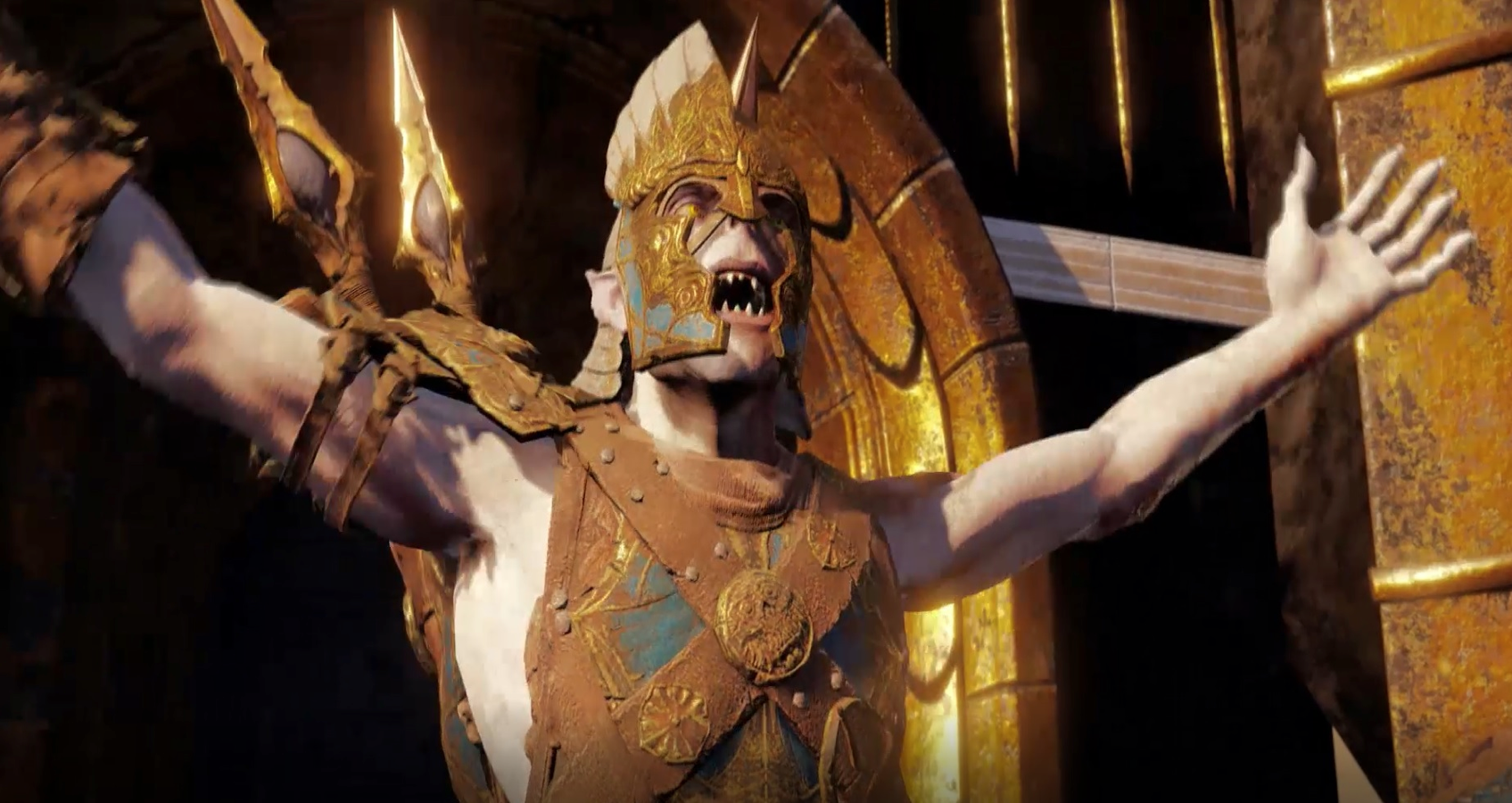
That shoulder pauldron only took 20 boxes to unlock
SHADOW OF WAR gives you a choice: grind away to the point of self-loathing, or cough up more money (remember, you’ve already spent at least $60 on the game at this point). Even when compared to other open-world RPGs, a genre that’s become synonymous with busy work, the level of tedium is somehow even more pronounced in SHADOW OF WAR, and barely even enjoyable after a point (this is coming from someone who’s spent minimum 80 hours per playthrough in DRAGON AGE: INQUISITION, six times). This abhorrent level of tedium is especially true of the final act entitled “Shadow Wars,” wherein you must persistently grind to gain those exceptionally powerful Epic and Legendary-tier Orcs to get to the “true ending” of the game. You can toil for untold hours for all the Orcs you need, or you can just drop $20 and save yourself an ulcer. The latter becomes especially enticing when you find out that all these brand new Orcs you just bought/toiled over can just as easily permanently die without any fault of your own, incentivizing you throw down more cash or repeat the grinding process all over again.
Even forgoing the notion of a massive grind, SHADOW OF WAR breadcrumbs you to the online marketplace in subtler ways to purchase its virtual fodder. The “Market” icon in the pause menu is constantly blinking away, reminding you it’s always there to be utilized. Likewise, whenever the player does inevitably decide to engage in Vendetta missions, they have to go through an online connection (which the Market operates under), and will occasionally receive loot boxes as rewards for completing the mission. But you have to redeem this lootbox somewhere. And, as you might expect, it’s through the Market, where you are free to peruse all the other options you can purchase immediately. To summarize: no, the microtransactions aren’t “shoved in your face,” necessarily. But with the methods the game employs in leading the consumer back to the market for an easy out, they might as well be.
What’s most disappointing though is that SHADOW OF WAR isn’t technically a “bad” game, but it’s held back from being great due to a number of flaws. Most of the game’s failings can be chalked up to Warner’s aforementioned greed, but there are few critical weaknesses in the design as well. While the game might be visually appealing and have a genuinely interesting mechanic with the Nemesis System, SHADOW OF WAR doesn’t have much to offer in the way of storytelling (which should be an immediate red flag for any RPG). Taking after its predecessor, the hot mess of a story sees you galavanting across Middle Earth slaughtering Uruk-Hai by the thousands because . . . reasons (“The sexy evil spider lady told me to do it!”), with your main cast being paper-thin and devoid of any real personality. As amusing as your interactions with the Orcs can be, they can’t be the bedrock for the entire flimsy narrative on their own, and with time become as stale as the rest of the grinding. Even using the argument that the game’s entire soul is derived from these brutish bozos, the game undermines their existence by giving you the ability to straight-up purchase them without a second thought, and indirectly encourages you to do so. Why should I care about Porfo the Bone-Juggler if I could replace him and his brothers with someone better for just a few bucks? The same goes for weapons, buffs, and armor, all of which may drop frequently, but just diminish in value almost immediately because of the loot boxes.
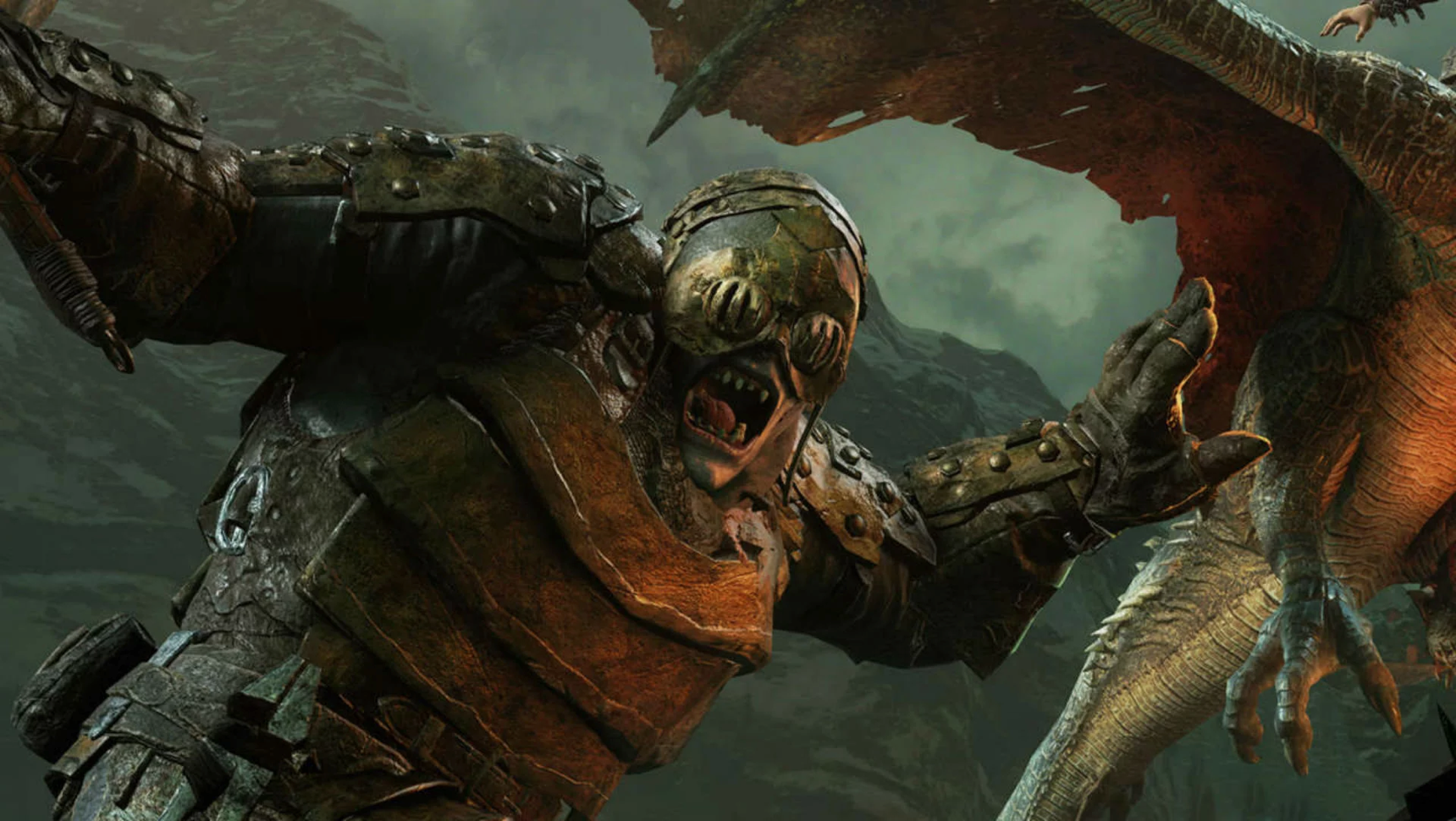
Porfo will always live on in my heart
This, along with bland locales paired with the monotonous grind of sieging one fortress before moving on to the next with little distinction besides surface details, ultimately leaves a game that feels more like a chore I’m obligated to do to justify my $60 minimum investment into it, rather than an actually fun or engaging experience. This is of course disregarding all the other standard AAA business fare, like gutting the game and selling parts of it back as Day One DLC and the terrible practice of the Season Pass, which only make the base game feel even more hollow. It’s sad that a serviceable game can have so much profiteering baked into it, spoiling the whole product.
And of course, this isn’t limited only to SHADOW OF WAR. Other recent games like FORZA MOTORSPORT 7 and DESTINY 2 feature loot boxes to entice players with cosmetic changes (one-time-only use, in DESTINY 2’s case) and buffers to gameplay that can all be found in-game. Similar, yet even worse, practices were seen in the STAR WARS: BATTLEFRONT 2 Beta, which illustrated that the game’s progression system will be entirely relegated to loot boxes, available upon release from the online marketplace. These will allow players, upon putting down at least a few extra bucks, to get a marked advantage over people who don’t, as these boxes contain significant stat boosts, abilities, and parts for weapons that your character needs to build to stand any kind of chance against the other team. These aren’t even cosmetic items; they have clear, tangible effects on who wins and who loses. We’ve hit Pay-To-Win territory in a AAA game.

And I can’t even give my Stormtrooper a pink paint job! THE FIENDS!
As long as gamers remain complacent, this situation is only going to get worse. Microtransactions, especially with loot boxes, have tested the waters and are working themselves into becoming the new norm, so ubiquitous with modern gaming that it’s become banal to even talk about. But it really shouldn’t be. SHADOW OF WAR shows that a game’s potential and value only diminish when we allow things like microtransactions to replace quality with convenience. So, do yourself and the community a favor: stop being apathetic and hit publishers where it hurts. Hit their wallets. Pick up other games that are content to limit their narratives within the price point on the box. Maybe then publishers will remember to treat their audiences like human beings instead of numbers.

